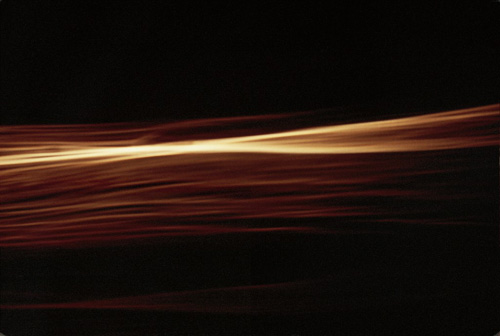Turning The Film Center Into A Dark Chamber Of Disclosure
By Steven Pate in Arts & Entertainment on Apr 12, 2011 9:00PM
 We still watch movies. We may not go see them in the theater as much as we used to (today's audience of 23 million per week seems laughable compared to the 90 million the movie palaces were pulling in in the late 1940s), but there are movies everywhere. Proliferating cable channels offering something to fit your mood. Blu-Rays and affordable DVDs for sale at everywhere from grocery stores to Best Buy, for rent at amazing stores we are lucky enough to have, sent to you through through the mail by NetFlix or Greencine, or streamed online via Netflix, Hulu, Apple and Mubi. And we haven't even mentioned YouTube, Vimeo or the many other online sources for video entertainment.
We still watch movies. We may not go see them in the theater as much as we used to (today's audience of 23 million per week seems laughable compared to the 90 million the movie palaces were pulling in in the late 1940s), but there are movies everywhere. Proliferating cable channels offering something to fit your mood. Blu-Rays and affordable DVDs for sale at everywhere from grocery stores to Best Buy, for rent at amazing stores we are lucky enough to have, sent to you through through the mail by NetFlix or Greencine, or streamed online via Netflix, Hulu, Apple and Mubi. And we haven't even mentioned YouTube, Vimeo or the many other online sources for video entertainment.
We have voted resoundingly for the convenience and personalization afforded by the digital video formats which allow us the flexibility to watch when and where we want to watch at the expense of the social experience of cinema-going. In a process that has been unfolding for more than 50 years now, the movie palaces were knocked down or abandoned in favor of carpeted extensions of shopping malls, bean counters where put in charge of the studios and theatrical exhibition treated as a promotional exercise for an industry which now makes its money from DVDs, merchandising tie-ins and overseas business. Avatar may have provided some of the Hollywood Kool-aid drinkers a bit of false hope that 3D may provide enough spectacle to get people out and in the seats, but with 3D televisions and game systems and iPad apps, technology is not going to reverse the trend.
Recapturing the magic and wonder the first cinema goers must have felt seems to be in the air. Just a week after David Francis and Joss Marsh presented a victorian-era magic lantern show which showed how telling a story using light used to seem magical and can still entrance, the Gene Siskel Film Studies Center hosts an event which takes the naive and quaint-seeming wonder of pre-cinematic technologies in a new direction. Artists and filmmakers Sandra Gibson and Luis Recorder have been collaborating for a decade on performances and installations using light and projection, and in their first-ever Chicago appearance will present their latest projector performance. Aberration of Light: Dark Chamber Disclosure uses "a system of film loops, crystals and hand gestures" to interrupt and modify the projector's beam, transforming the theatrical space into a sculpture of light.
Chicago-based composer Olivia Block provides the soundtrack, and will be in attendance for the performance along with the artists for a discussion. It may not completely recapture the wonder of a world before the ubiquity of movies, but it promises to be a film event you will never be able to experience on your iPod.
Aberration of Light: Dark Chamber Disclosure, part of the Gene Siskel Film Studies Center's "Conversations at the Edge" series, takes place Thursday, April 14 at 6 p.m. Tickets are available online.